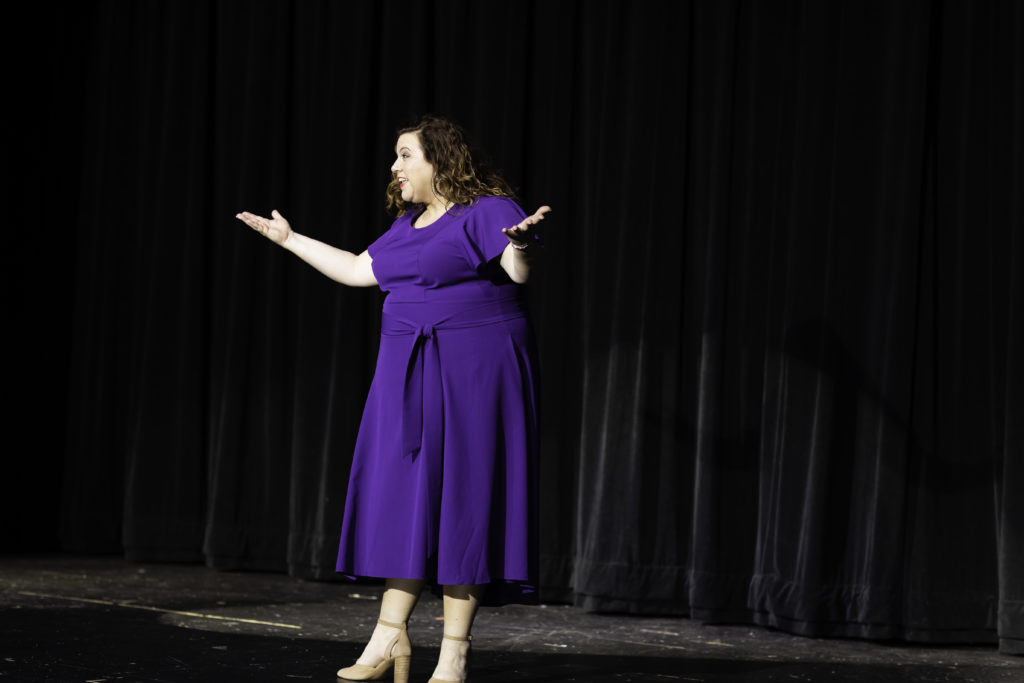What’s the movie that plays in your mind about yourself? An even more important question, who’s writing the script?

Earlier this year, I did a photoshoot for my speaker website. (Y’all, just typing that sentence brings up all kinds of stories. An internal movie that I am actively editing.)
For years (and if I’m completely transparent, decades), I’ve lived with an invisible internal writers’ room of voices. Voices in my mind formed by untrue things said to me by real, live people.
Who’s writing the script of your internal story?
I’m not talking about welcoming wise input. I mean allowing the internal script to run rampant like a scene from Jumanji.
How did my writers’ room develop?
As a young adult, I asked a couple of people a scary question, “I think I have a talent for speaking. What does it look like to teach and speak?”
The responses were less than supportive. This was the beginning of the writers’ room.
Over the years, these voices repeated to me:
- “You shouldn’t want that.”
- “Only arrogant people want to do that.”
- “You can do just as much teaching one on one.”
- “Do you just want to be famous?”
- “You’re just looking for attention.”
- “You’re making this the Jenn show.”
- “You’re really talented, but we need to invest in the men.” (Yep, that was actually said to me.)
Who’s writing the script of your internal story?
I felt discouraged, unseen, misunderstood, and so confused. And I felt shame. Shame for exploring a gift that I knew could help people.
In all fairness, I believe that many of these voices wanted to protect me. Some of them felt threatened. Others, I think, couldn’t get past their own fears and insecurities and projected those to me.
One time, a leader asked me to read as part of an event. Essentially a monologue for a transition, I would read a passage offstage while the room was darkened and sets changed.
In the inky grey backstage, I swayed side-to-side, blinking too fast. Gripping a cordless mic, I was saying to myself, “Ok, Jennifer. This is your chance to prove you are good at this. Don’t be too good, though, because then people will think you’re trying to steal the spotlight. So be good enough that the audience feels this part, but not so good they wonder who narrated that section.”
Y’all. WHAT IN THE WORLD?
I continued to cope with the voices by contorting myself, smooshing myself, pretending I wasn’t capable of one of my greatest gifts. I made myself something I’m not so other people could feel more comfortable. I wasn’t afraid I would fail; I feared what people would say if I succeeded.
Where have you done this? What popped into your mind just now?
In that darkened backstage, I had not yet heard this important idea:
“Our deepest fear is not that we are inadequate. Our deepest fear is that we are powerful beyond measure. It is our light, not our darkness, that most frightens us. We ask ourselves, Who am I to be brilliant, gorgeous, talented, fabulous? Actually, who are you not to be? You are a child of God. Your playing small doesn’t serve the world.”
—Marianne Williamson
That’s who I want in my writers’ room.

Over the last several years, I’ve wrestled those other voices to the ground. Some of them were clinging like barnacles to their position in my mind. How do I stop believing something that isn’t true?
Let’s walk through how I fired some of those writers. As your reading, I recommend grabbing a pen. I bet some of your mean writers will pop up. And this will help you get rid of them too.
Five Steps to Changing Your Story Mindset
- Identify the story. What am I believing in my internal dialogue?
So in the way-back machine, one of the most damaging scripts, “You shouldn’t want that.”
When I would ask or offer for an opportunity to speak, my cheeks would get tingly hot, and I’d wince internally, waiting for the reprimand. I believed I shouldn’t want to speak. That offering to help in a way that so many people want to avoid—public speaking—was shameful. - Find the writer. Who said this to me? When?
When I was in my early 20s, an experienced leader who did fairly regular speaking mentored me a bit.
As we sipped tea at a Formica and chrome table, I shared I wanted to explore teaching and speaking. I thought I had a natural gifting, and I wanted to see how I could help people with it. Light from windows behind her illuminated her ash blonde hair as she shook her head, “Oh, you shouldn’t want that.”
The rest of what I remember her saying included: “I don’t want that. I only speak when I have to. That’s just not something you ask to do; people will find you. I would much rather sit with you like this than be in front of a group.”
This story weighed heavily because she was a mentor, a leader I respected.
- Analyze the content. Was the story true? Is it true now?
Let’s break down this story.
Is it true I shouldn’t want to use a gift that I enjoy and helps people? No.
Is it true people don’t ask to use their gifts? No! We apply for jobs. We pitch clients. We ask for promotions.
(Also, did you catch in that story what she would rather do, not what I could do?)
But what if the story was true then?
Sometimes we hold stories that were helpful at the time. And we outgrown some stories. We need to ask, “Is it true now?”
- Uncover a better story. What is the new story I will believe?
The new story for me has been quite a fight.
Therapy, coaching, dismantling, untangling, and firing this writers’ room wasn’t enough. I needed to hire new writers for a new script. One that is true, based in reality, and helpful to my growth and overall well-being.
Once I started looking for new stories, I could find them everywhere.
I was the emcee of my junior high talent show in 8th grade (Height of awkward, and I loved every minute.)
I regularly spoke to hundreds of parents, including making statistics accessible and meaningful. (I mean, statistics!)
Every time I had the opportunity to serve an audience, people laughed, learned, and felt equipped.
To make the new story sticky, I picked a moment—one place in time to focus on. Sitting in a conference room, I was munching on pizza with colleagues. We were chatting about our big dreams during a break from tedious work. At a much larger Formica table, I shared I wanted to be a speaker. And my colleague fixed her blue-green eyes on me and said, “You belong on a stage with a microphone.”
That’s the new moment. The new story. And it’s true.
- Practice and affirm. What do I say now?
Ugh, “You shouldn’t want that” kept rattling around in my head.
I needed a replacement script. One I could use when this phrase popped up, but also to keep it away. Something to write a new story.
I believe words have incredible power. In my faith, the spoken word of God created the universe. Now that’s something! So began to say, with my out-loud voice, “I have a right to speak. My words bring life.”
The first time I said it, my voice quivered, and I questioned if I had permission to say that! It felt so bold and presumptuous! Despite the lack of surety, I continued to say it. Repeatedly, daily, and my voice got stronger.
And a crazy thing happened, not only did I start to believe it, I began to see the results of this story. My words bring life. They help people. This new phrase focused my actions, and I could see the life-giving power of my words.
I am far less afraid of the light I bring to the world.

What story came up from you? Which movie in your mind came up…the one holding a little too much rent-free screen time in your mind?
What are the untrue voices that keep you from living not just your dreams but the way you are uniquely gifted?
Can I invite you to take a few minutes to examine this? See what comes up. And then work through the five steps.
Identify the story.
Find the writer.
Analyze the content.
Uncover a better story.
Practice and affirm.
What are the untrue voices that keep you from living not just your dreams but the way you are uniquely gifted?
Tell me in the comments…what’s the new story you’re writing?
Do you ever hear people say, “Do your work”? This is the work. Letting go (or even kicking out) old, untrue, and unhelpful writers and hiring new ones that help you and others live wholehearted, flourishing, and peaceful lives.
(If you’re unsure how this impacts your leadership, let me say this: the one who tells the story is the one who has the power. If you aren’t writing your internal narrative, you’re not leading yourself. And it’s a challenge to lead others effectively if you’re not leading yourself first.)
Ok, I’ve got to go hop on the stage. I’ve got some life-giving words to say.


COMMENTs:
0